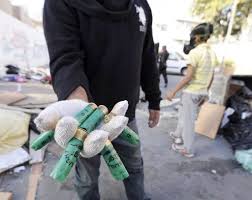Bahrain’s Street Defenders Hold Regime’s Violent, Thieving, Rapacious Police Thugs at Bay
Article 12 Universal Declaration of Human Rights states:
No one shall be subjected to arbitrary interference with his privacy, family, home or correspondence, nor to attacks upon his honour and reputation. Everyone has the right to the protection of the law against such interference or attacks.
Bahrain forces assault child
Al Wefaq – 8 October, 2013
Bahrain regime forces have assaulted a minor during a patrol round in a residential area. According to his family, the area wasn’t witnessing any demonstrations at the time. The forces beat the boy and caused a fracture in his hand and injuries in different parts of his body.
The incident reflects the barbarian and terrorizing behavior of the regime’s mercenary forces in dealing with children and the citizens in general.
October 9, 2013 No Comments
Psychiatrists Deeply Concerned For 5% Of Americans Who Approve Of Congress
Psychiatrists Deeply Concerned For 5% Of Americans Who Approve Of Congress
9 October, 2013 – The Onion
WASHINGTON—Noting that the individuals in question may be extremely mentally disturbed or suffering from a serious psychological illness, the nation’s psychiatrists announced Wednesday that they are deeply concerned for the estimated 5 percent of Americans who were found in nationwide polls this week to approve of the U.S. Congress. “With numerous members of Congress refusing to negotiate an end to the shutdown in the face of widespread federal furloughs and a looming deadline to avoid defaulting on government debt, we are extremely concerned for the mental health of those Americans who responded, ‘Yes, we think Congress is doing a good job,’” psychiatrist Dr. Donald Levin said in a press conference this morning.
Dr. Donald Levin, told reporters that the estimated 15.5 million Americans who approve of Congress are likely “very troubled” citizens who may in fact be experiencing psychotic episodes or delusional thoughts. “We’re not entirely sure who these people are or where they come from—perhaps they are psych ward patients, or unstable recluses living in remote huts on the outskirts of society—but what we do know is that they are extremely disconnected from reality and in need of immediate attention if they are not already receiving it. We need to find these people and get them the help they need before their illnesses get worse.”
Psychiatrists added that because a number of mental health services are currently furloughed, many respondents would just have to “sit tight and hang in there” until the shutdown is resolved. …source
October 9, 2013 No Comments
Saudis stretched to cope with waning US dominance in Middle Eastern Affairs
Insight: Saudis brace for ‘nightmare’ of US-Iran rapprochement
9 October, 2013 – Egypt Independent – Reuters
When Saudi Arabia’s veteran foreign minister, Prince Saud al-Faisal, made no annual address to the United Nations General Assembly last week for the first time ever, his unspoken message could hardly have been louder.
For most countries, refusing to give a scheduled speech would count as little more than a diplomatic slap on the wrist, but for staid Saudi Arabia, which prefers back-room politicking to the public arena, it was uncharacteristically forthright.
Engaged in what they see as a life-and-death struggle for the future of the Middle East with arch-rival Iran, Saudi rulers are furious that the international body has taken no action over Syria, where they and Tehran back opposing sides.
Unlike in years past, they are not only angry with permanent Security Council members China and Russia, however, but with the United States, which they believe has repeatedly let down its Arab friends with policies they see as both weak and naive.
Like Washington’s other main Middle Eastern ally, Israel, the Saudis fear that President Barack Obama has in the process allowed mutual enemies to gain an upper hand.
The alliance between the United States, the biggest economy and most powerful democracy, and Saudi Arabia, the Islamic monarchy that dominates oil supplies, is not about to break.
But, as happened 40 years ago next week when an OPEC oil embargo punished US war support for Israel, Riyadh is willing – albeit without touching energy supplies – to defy Washington in defense of its regional interests. The two have been at odds over Egypt since the Arab Spring, and increasingly so on Syria, where Saudi Arabia could now do more to arm Sunni Muslim rebels.
The real focus of Saudi anger is the Shi’ite Muslim clerics who have preached Islamic revolution since coming to power in Tehran 34 years ago, and whose hands Riyadh sees orchestrating political foes in half a dozen Arab countries.
Already aghast at US reluctance to back rebels fighting Syrian President Bashar al-Assad, Tehran’s strongest Arab friend, Saudi princes were horrified to see Washington reaching out to Hassan Rouhani, the new Iranian president, last month.
“The Saudis’ worst nightmare would be the administration striking a grand bargain with Iran,” said former diplomat Robert Jordan, who was US ambassador to Riyadh from 2001 to 2003.
Although any meaningful US-Iranian rapprochement looks distant, Obama telephoned Rouhani, an emollient self-described moderate, during the United Nations General Assembly.
The Saudis now fear Obama may be tempted to thaw ties with Tehran by striking a deal to allow inspections of its atomic sites in return for allowing Iranian allies to go on dominating Arab countries such as Lebanon, Syria and Iraq. That such a bargain has never been publicly mooted from within the Obama administration has not stopped Saudis voicing their concerns.
“I am afraid in case there is something hidden,” said Abdullah al-Askar, chairman of the foreign affairs committee in Saudi Arabia’s advisory parliament, the Shoura Council. “If America and Iran reach an understanding it may be at the cost of the Arab world and the Gulf states, particularly Saudi Arabia.”
Askar stressed he was not privy to government thinking on the issue and was speaking in a purely personal capacity. …more
October 9, 2013 No Comments
After Obama’s ‘near miss’ on Syria, Brits step away from incoherent US Foreign Policy
Iran, Britain Agree to Name Non-Resident Diplomats
9 October, 2013 – FARS
TEHRAN (FNA)- Iran and Britain have agreed to appoint non-resident charges d’affaires as a first step towards reopening of embassies, Iranian Foreign Ministry Spokeswoman Marziyeh Afkham said.
“Following negotiations between the two foreign ministers in New York, it has been agreed that talks shall continue between representatives of the two foreign ministries,” Afkham said on Tuesday.
“And following these talks, British Foreign Secretary William Hague, in a telephone conversation with (Iranian Foreign Minister Mohammad Javad) Zarif yesterday (Monday), proposed that the two countries move to appoint non-resident chargés d’affaires in their respective capitals,” she added, press tv reported.
In a meeting at the UN Headquarters in New York City on September 23, Zarif and Hague discussed the improvement of Tehran-London relations, Iran’s nuclear energy program as well as regional developments.
Afkham said in view of the Iranian parliament’s approval of a bill to downgrade Iran-UK ties, Tehran and London agreed to maintain ties at the level of non-resident chargés d’affaires as of Tuesday.
On November 27, 2011, Iranian lawmakers voted by a large majority to downgrade diplomatic ties with the United Kingdom, in response to Britain’s decision to impose sanctions on the Central Bank of Iran over the allegation that Iran is pursuing non-civilian objectives in its nuclear energy program.
Two days after the decision by the Iranian parliament, hundreds of Iranian students staged a protest outside the British Embassy in Tehran and pulled down the UK flag.
On November 30 of the same year, London cut off its ties with Tehran, withdrew its diplomatic staff from Iran and the Iranian Embassy in London was closed. …source
October 9, 2013 No Comments
The Saudi-Bahrain Sectarian Divide, is an Engineered Apartheid
The Sectarian Gulf vs. the Arab Spring
By Toby Matthiesen – 8 October, 2013 – FP, Foreign Policy
I first visited the Eastern Province in 2008 while on a fieldwork trip. Traveling on a railroad built by the Americans for King Abdulaziz al Saud, the founder of the modern Kingdom of Saudi Arabia, as a favor in return for the right to explore Saudi oil reserves, I left the shiny skyscrapers and crowded streets of the capital Riyadh and arrived in Hofuf in the al-Ahsa oasis, which together with Qatif is the main center of Shiite settlement in Saudi Arabia. In these towns and surrounding villages, some side streets have no pavement, old city centers are decaying, and youth unemployment is high. For decades, Shiites have also complained of sectarian discrimination in religious practices, government employment, and the judicial system, all of which contributes to the feeling that they are being treated like second-class citizens.
When faced with rising political challenges in early 2011, the Gulf states — Bahrain and Saudi Arabia in particular — mobilized sectarianism in order to suppress domestic calls for reform, a strategy that I analyze in my recent book Sectarian Gulf: Bahrain, Saudi Arabia, and the Arab Spring that Wasn’t. I saw first-hand how the invention of a “Shiite threat” narrative unfolded, standing on the now demolished Pearl Roundabout in the Bahraini capital Manama in mid-February 2011. Initially, tens of thousands, mainly Shiite (but also some Sunni), protesters poured into the streets to demand political reform. After the first protesters were shot, a part of the protest movement became radicalized, and started calling for the removal of the ruling family. Bahrain has a Shiite majority population (between 60 and 70 percent) and the ruling family is Sunni, so the ruling family used official and semi-official media to try to portray this as a “sectarian” uprising of one sect against the other.
Just as President Bashar al-Assad is doing in Syria, this strategy of sectarian polarization was aimed at delegitimizing the opposition, and scaring the minority Sunnis of a possible alternative political system and into total allegiance with the ruling family. A month after the protests started, on March 14, 2011, Saudi troops rolled over the causeway that links the Saudi Eastern Province with Bahrain. The king of Bahrain imposed a state of emergency, and a campaign of arrests, torture, mass dismissals and extrajudicial killings started, mainly directed against members of the Shiite sect.
At the same time, the Saudi media empire, which controls much of the pan-Arab media, started taking up the Bahraini narrative and accused all the Shiites in the Gulf states of planning an uprising at the behest of Iran. This narrative was as much directed against the Bahraini Shiites, as against the Saudi Shiites, of whom there are between two and three million mainly concentrated in the oil-rich Eastern Province. Galvanized by the Bahrain uprising, they started a protest movement of their own, and were the only Saudis to go out into the streets when social media sites called for a Saudi chapter of the region-wide Arab Spring in March 2011. Other Saudis have since taken to the streets to demand the release of political prisoners but by and large the protest movement in the Eastern Province failed to spill over to the rest of the country.
Rather than addressing the real grievances of their Shiite citizens or instituting some political reform, as the Bahraini protesters were demanding, the Gulf states reacted with an “iron fist,” as the Saudi Ministry of Interior put it. They spearheaded the regional counter-revolution and spread a vicious sectarian hate speech that would shape the discourse and actions of the rebels in Syria, while preventing Shiites and Sunnis at home from uniting in calls for reform. The Gulf countries’ demonization of the Shiites has led to a virtual “sectarian Gulf.” Local Shiites (and foreign Shiites such as Lebanese or South-East Asians) are collectively marginalized and brandished as a fifth column. This has led to a breakdown of the cross-sectarian social fabric in the Gulf and beyond, with many Sunni Islamists from the Gulf funding the rebels in Syria, while the loyalties of many Gulf Shiites lie with the Assad regime and Hezbollah. Syria has then become a locus for yet another proxy-conflict, one that sets a dangerous precedent for Sunni-Shiite relations in the Gulf and beyond.
If the Gulf states are really concerned about the loyalty of their Shiite subjects, they should accept them as full and equal citizens. The current policy of stigmatization and collective punishment is alienating many Gulf Shiites and is driving small groups of opposition activists back into the Iranian nexus, a connection that had existed after the Iranian Revolution of 1979 but had been largely capped since most Gulf Shiite oppositionists returned from exile throughout the 1990s. While Iran does not have the kind of influence over Gulf Shiite political movements it had in the 1980s, and the Shiites in the Gulf do not protest because of affinity with Iran, there are signs that Iran and Lebanon’s Hezbollah are again trying to reach out to Bahraini and Saudi Shiite opposition activists. A realignment of some Gulf Shiite opposition groups with Iran or Shiite militias across the region would come as a response to the Gulf states’ sectarian counter-revolution and their vicious crackdown on any form of dissent. This would be a self-fulfilling prophecy that should be avoided.
The Gulf states’ sectarian strategy also puts a new light on the Gulf’s shifting relationship with political Islam and its support for the crackdown on the Muslim Brotherhood in Egypt. While popular wisdom usually sees the Gulf states as promoters of political Islam, they have a very ambiguous relationship with Islamist movements across the Middle East, and apart from Qatar, no Gulf state is backing the main Arab Sunni Islamist group, the Muslim Brotherhood, unconditionally. Some Gulf states were the main supporters of the recent military coup against the Muslim Brotherhood-dominated government: Saudi Arabia, the United Arab Emirates, and Kuwait immediately pledged $12 billion of aid to the new government. This was, in part, because the Brotherhood and its Qatari backers did not fit comfortably into the anti-democratic and sectarian agenda that these regimes view as essential to their own survival. The rise of an alternative Sunni Islamic model of politics was to be avoided at all costs and the hate speech directed against supporters of the Muslim Brotherhood both in Egypt and in the Gulf, denouncing them as the enemy within, is similar to the hate speech directed against the Shiites.
But if the Gulf states are serious about long-term stability in the region, they should enable the inclusion of pro-democracy Islamic movements in the political process both at home and in the wider region. The West should not again pick sides in these intra-Islamic feuds (the intervention in Iraq in 2003 was one of the key events that paved the way for the current sectarian polarization). Rather than backing Sunni Islamist rebels in Syria and buying into the “Shiite threat” narrative emanating from Gulf capitals, the West should urge its allies in the Gulf to tame down sectarian rhetoric and negotiate a new social contract. Barring that, the sectarian civil war that is now effectively stretching from Beirut to Basra may come back to haunt the Gulf states and their Western supporters.
October 9, 2013 No Comments
Bahrain State Terror leaves PM bin Salman’ call to reject violence a fools utterace

Bahrain Protestor Bird-shot by Riot Police during Recent Village Raids, Round-up and Detention
HRH Premier: Whoever abstains from rejecting violence is not eligible to talk about reform
9 October, 2013 – BNA
Manama, Oct. 9. (BNA) – His Royal Highness Prime Minister Prince Khalifa bin Salman Al Khalifa has urged all government departments to take the necessary measures to implement the recommendations issued by the National Assembly and apply the law strictly and firmly.
He stressed that in line with the Royal desire and the will of the people of Bahrain, state departments have no other option but to implement the recommendations “directly and immediately” so that every citizens feels secure in his daily life.
This came as HRH Premier chaired here today a security and civil meeting in which he reviewed the security situation in the kingdom, especially regarding combating terrorism.
He emphasised that violence, terrorism and involvement in providing cover for groups of saboteurs who aim to undermine the kingdom’s security, stability and hard-won achievements cannot, as proved throughout history, create a reform-friendly environment.
Embracing violence, adopting political sectarianism and resorting to foreign sides can only lead to an environment that is hostile to reform and real progress, he explained.
HRH Premier stressed that whoever abstains from renouncing violence and repudiating perpetrators openly and firmly is not eligible enough to talk about reform, democracy and serious desire to bring about real development.
He pointed out that whoever rejects national consensus and engages in some practices to exert pressure in order to earn narrow gains lacks seriousness, will to enhance all-inclusive national work and credibility.
HRH Prime Minister affirmed that the government has the right to ensure that all sides, including political associations, adhere to the laws regulating political work in the kingdom.
He stressed that practising political work transparently and according to legal norms is a basic requirement in order to ensure its legitimacy and protect its principles. ..source
October 9, 2013 No Comments
Lebanese Politicians Loud Support for Popular Uprising in Bahrain
October 9, 2013 No Comments
Bahrain Crackdown Rivals that of days of Martial Law
Bahrain steps up crackdown on dissent, Al-Wefaq says
9 October, 2013 – PressTV
Bahrain’s main opposition party says the Al Khalifa regime’s harsh crackdown on pro-democracy activists has intensified over the past month, with the highest levels of violence since the uprising began in 2011.
The al-Wefaq National Islamic Society has documented 1,900 cases of human rights violations in a report only in the month of September, including incidents in which regime forces used excessive force or torture.
According to the report, last month, 214 anti-regime protesters were arrested, including two women and 40 children, the highest number since the revolution began.
The al-Wefaq report also said that 111 activists, who were convicted by a Bahraini court and given sentences of up to 15 years, were tried based on fabricated charges.
On Monday, Bahrainis took to the streets in the northeastern island of Sitra for the sixth consecutive day to denounce the regime’s unrelenting crackdown on pro-democracy protests.
People from all walks of life attended marches in Sitra to demand reforms and an end to the decades-old rule of the Al Khalifa dynasty.
Earlier in the day, a court in Bahrain sentenced nine anti-regime activists to life in prison after convicting them of being allegedly involved in an attack in November 2011 in the capital Manama.
Four of the defendants, who were present at the court, had previously said that they were subjected to torture and mistreatment in solitary confinement.
Five other defendants, tried in absentia, were handed additional 10-year jail terms for failing to hand themselves in.
The verdict brought to 104 the number of pro-democracy protesters sentenced to lengthy jail terms in Bahrain.
Similar rallies were also held in the villages of Nuwaidrat and Samahich close to Sitra, where protesters expressed solidarity with the detainees and condemned the unjust sentences.
Since mid-February 2011, thousands of pro-democracy protesters have staged numerous demonstrations in the streets of Bahrain, calling for the Al Khalifa royal family to relinquish power.
According to local sources, scores of people have been killed and hundreds arrested.
Physicians for Human Rights says doctors and nurses have been detained, tortured, or disappeared because they have “evidence of atrocities committed by the authorities, security forces, and riot police” in the crackdown on anti-government protesters. …source
October 9, 2013 No Comments
Ousting Bahraini Prime Minister as a step toward Democracy is a Fiction
Opposition Group: Ousting Bahraini PM First Step towards Democracy
9 October, 2013 – FARS
TEHRAN (FNA)- A senior member of Bahrain’s al-Wefaq National Islamic Society said if the Bahraini king sacks his uncle Prime Minister Prince Khalifa bin Salman Al Khalif, he would help settle the crisis in the country in peaceful ways.
“Demands for the resignation of Prime Minister Prince Khalifa bin Salman Al Khalifa from his post are the first step for the settlement of the crisis which has entangled Bahrain,” Majid Milad told FNA on Wednesday.
His remarks came after the Lebanese al-Safir newspaper reported Washington’s demand from Bahraini King Hamad to oust his uncle from the post which is occupied by him for four decades.
Milad said if the demand is materialized, the Bahraini dissidents will stop their demonstrations and will wait for continued trend of reforms.
Bahrainis have earlier staged anti-regime demonstration in the capital, Manama to call for the kingdom’s long-time prime minister to resign.
Late in September, the demonstrators said Salman Al Khalifa’s resignation will pave the way for the establishment of a democratically-elected government.
Salman, who is an uncle of King Hamad, has been in his post since 1971.
They also called for an end to the dictatorship of the ruling Al Khalifa regime and sectarian measures taken against the country’s Shiite majority.
Anti-government protesters have been holding peaceful demonstrations across Bahrain since mid-February 2011, calling for an end to the al-Khalifa dynasty.
Violence against the defenseless people escalated after a Saudi-led conglomerate of police, security and military forces from the Persian Gulf Cooperation Council (PGCC) member states – Saudi Arabia, Kuwait, the United Arab Emirates, Oman and Qatar – were dispatched to the tiny Persian Gulf kingdom on March 2011, to help Manama crack down on peaceful protestors.
So far, tens of protesters have been killed, hundreds have gone missing and thousands of others have been injured.
…source
October 9, 2013 No Comments
Dozens of Birdshot Blindings Haunt Bahrain Regime on “World Sight Day”
Bahrain marks World Sight Day
10 September, 2013 – BNA
Manama: Oct. 9 – (BNA)– The Kingdom of Bahrain, represented by the Saudi-Bahraini Institute for the Blind, celebrates the World Sight Day (WSD) which falls on 10th October. The Kingdom of Bahrain also celebrates the White Cane Day which falls on 15th October.
The Director of the Saudi-Bahraini Institute for the Blind, Mr. Abdulwahid Mohammed Al-Khayyat, said the celebration of both occasions this year comes under the slogan: (Healthy Eyesight for Everybody) which reflects the diligence of the beloved Kingdom and its wise leadership vis-à-vis members of the community who have special needs and the blind. He pointed out that the Institute celebrates the White Cane Day which is the symbol and motto of the Blind in their mobility and kinesis in order to increase awareness about this dear category of community members and to define their difficulties and services provided to them from centres and institutions of poor visibility. He said that the day to celebrate the White Cane Day has been decided by the International Federation for the Blind. The White Cane is a symbol and announces that its carrier is a blind person.
On this occasion, Mr. Al-Khayyat expressed his gratitude and appreciation to all public and private institutions, banks, national companies, dignitaries, for their unlimited support to the activities of the Institute. He also thanked all Ministry of Education officials, led by H.E. Dr. Majid bin Ali Al-Nuaimi and ministry undersecretaries, assistant undersecretaries, departmental directors and school principals for their contribution which ensured the success of merging blind students in mainstream education.
Mr. AlKhayyat also expressed gratitude and appreciation to Minister of Health Mr. Sadiq Al-Shehabi, Minister of Housing engineer Bassim Al-Hammer for their support to the Institute, its employees and students. …source
October 9, 2013 No Comments









































